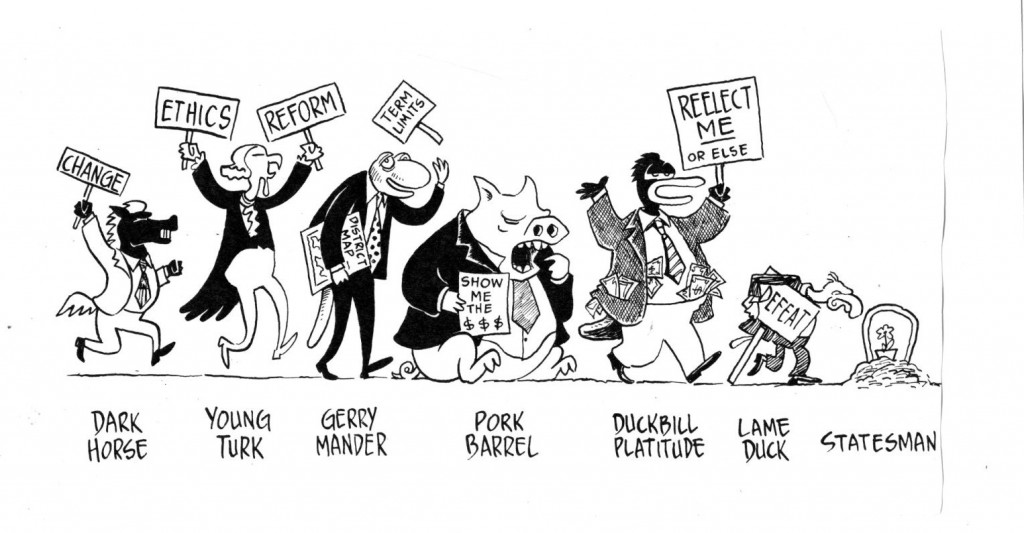An elementary starting point for all political theory, therefore, is the existential fact that members of the human species live together, whatever may be the elements of instinct, habit, necessity or choice that induce people to form societies.
If man is a social animal, is he then necessarily a political animal? Aristotle said he is, and it has remained a generally accepted truth until recently.
ADVERTISEMENTS:
But opinion now veers round the belief that man is neither instinctively nor by learning necessarily a political animal. Adherents of this point of view, who are now many, particularly in the United States of America, admit that few people ever live outside the State. They also admit that the advantages of living together far outweigh the disadvantages.
“Nonetheless, though human beings must and do live in political systems and share the benefits of political life, they do not necessarily participate in political life; they are not necessarily interested in politics, nor do they always care what happens in politics; nor know much about political events, or share in making decisions.” In fact, in most States “the political stratum is a minority of the adult population.
Moreover, those who are highly interested, concerned, informed, and active are an even smaller minority, within the political stratum.” Political systems, they argue, are developed simply because human beings are social and as they cannot live together without entering into relationships of influence, consequently, “Whenever these relationships become stable and repetitive, political systems exist.”
But this is exactly not so. The practice of politics is necessarily as old as society itself. It is born when men began to speculate about the rules of conduct by which they should be governed and matured with the succeeding generations when they began to ask whether these rules by which their ancestors were governed ought to be accepted, or ought to have been accepted in the past.
ADVERTISEMENTS:
Why some societies choose different rules from others, whether it is possible to discover general rules of conduct which could or should be applicable to all societies. In answering these questions they go into the basic questions of purposes for which human societies exist and their relation to the purposes of human life itself.
It is obviously a quest for a just and happy life for men assembled together in a territorially integrated society and, as such, the best form of relationship manifested in their governance that can ensure such a life.
This quest has been incessantly going on for centuries together without reaching agreed conclusions. Nor is there any likelihood that men will ever do so, for human civilisations are forever changing and so do change their values.
What seems true and even self-evident for one generation or one civilisation is frequently rejected by the succeeding generations. “Each generation,” explains Dorothy Pickles, “as it becomes adult is faced with the responsibility of deciding whether to accept the rules made or accepted by earlier generations, or whether to challenge their validity and try to replace them by others.”
ADVERTISEMENTS:
It does not, however, mean that all men are equally concerned with the political life of society to which they belong. Some peoples are indifferent to politics, others deplore them. But quite a many play the game of politics.
Even the ordinary citizen, making up his mind whether to vote for A or B, may be invisibly trying to answer a sort of question which Plato and Aristotle had tried to answer over 2,000 years ago, namely, what is the best form of government?
He may not be thinking in terms of vital issues involved in such a question. He may be simply trying to decide whether A or B is more likely to further his personal or professional interests.
Even so, he is one of thousands of his fellow citizens who is incessantly helping to formulate an answer of some kind to the question: what is the best form of government for me? And the multitude of different answers given by him and his fellow citizens go to form the way in which government in a particular country develops. It is the wisdom of generations that goes to make the political apparatus of a country and its culture.
The impact which one individual citizen makes on his own or the succeeding generations may be very small, but some critics of the existing social order “have so touched the minds or hearts of their fellow citizens or citizens of other times or other countries that they have helped to bring about great changes in the organisation of government”.
Plato and Aristotle still exercise profound influences on the thought of Western Europe and Rousseau and Marx are the beau ideal of millions of people beyond the frontiers of their own countries.
Locke’s teachings had a deep impact on the Americans and the French, the former seeking to justify their struggle for independence and freedom from foreign rule and the latter seeking to justify man’s right to revolt against the arbitrary rule, which had plagued these countries for centuries together.
Gandhi dedicated himself to uplift man and society simultaneously. He was out to moralise man and society and in his attempt to realise a better ordering of society, he devised a new moral strategy; the method of regulating along non-violent lines group life in its political, economic and international aspects.
By his twin principles of truth and non-violence, Gandhi revolutionised the course of politics and the present-day world standing on the brink of an abysmal cataclysm does find solace in the Gandhian outlook and his peaceful technique. Gandhi’s teachings are more relevant today than they were in his lifetime and this fact has been universally admitted.

